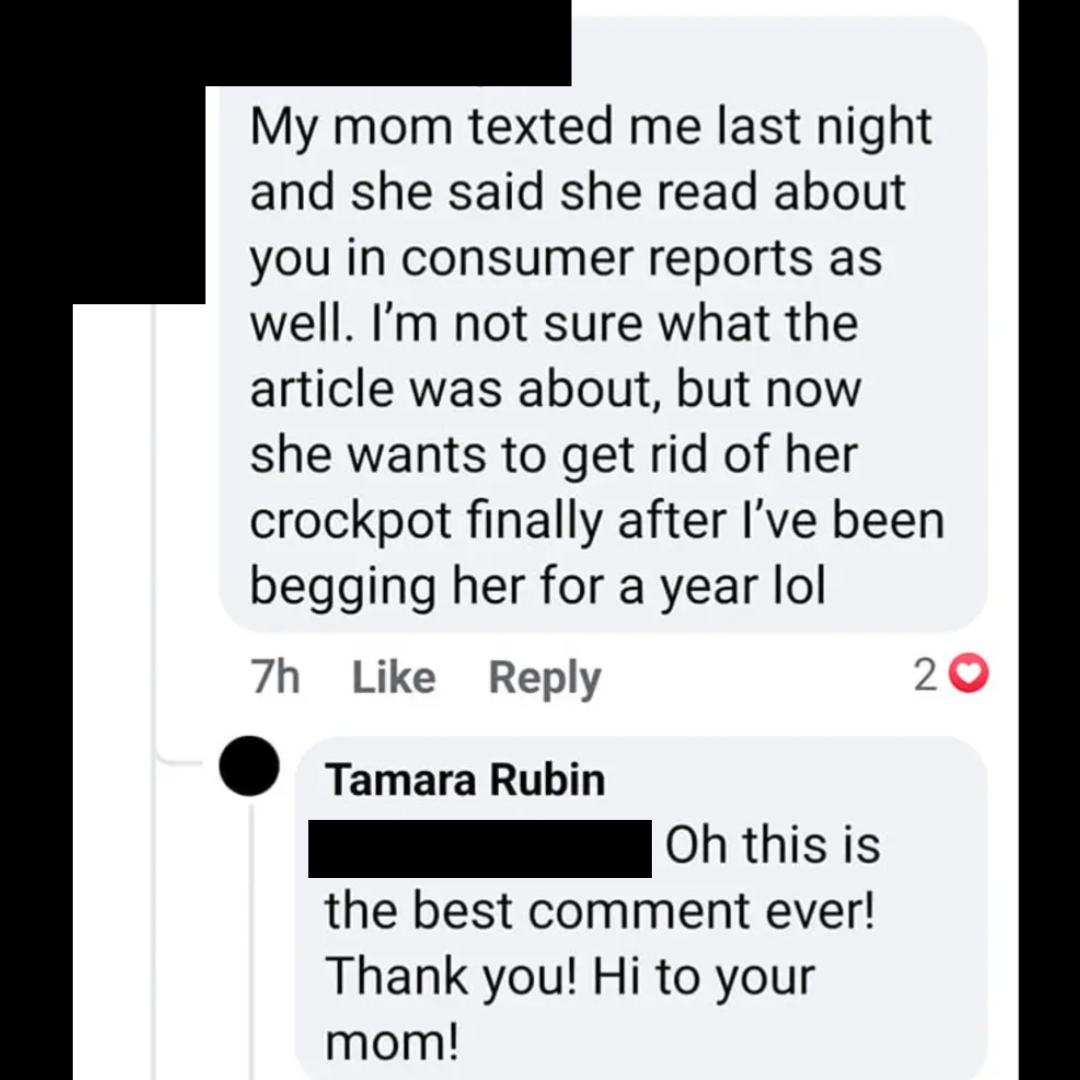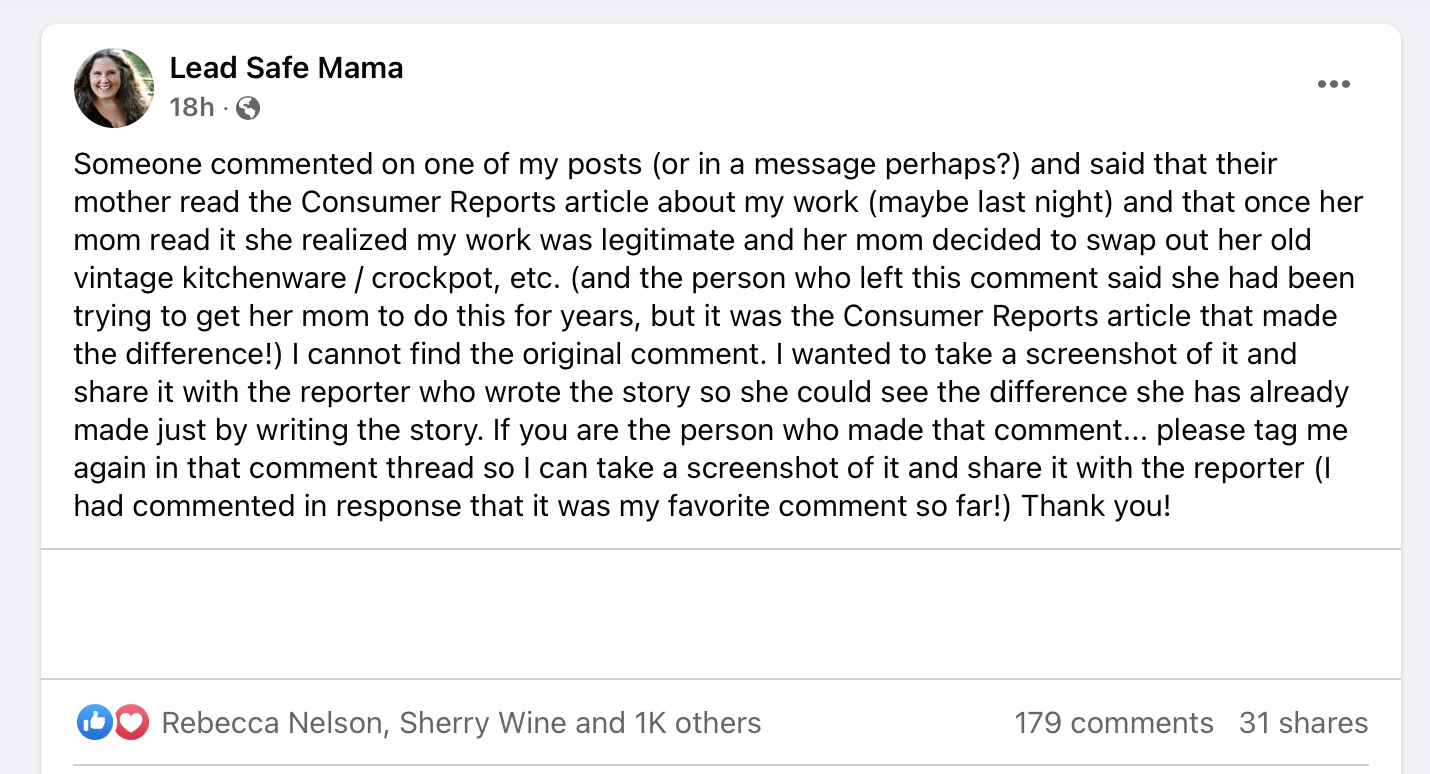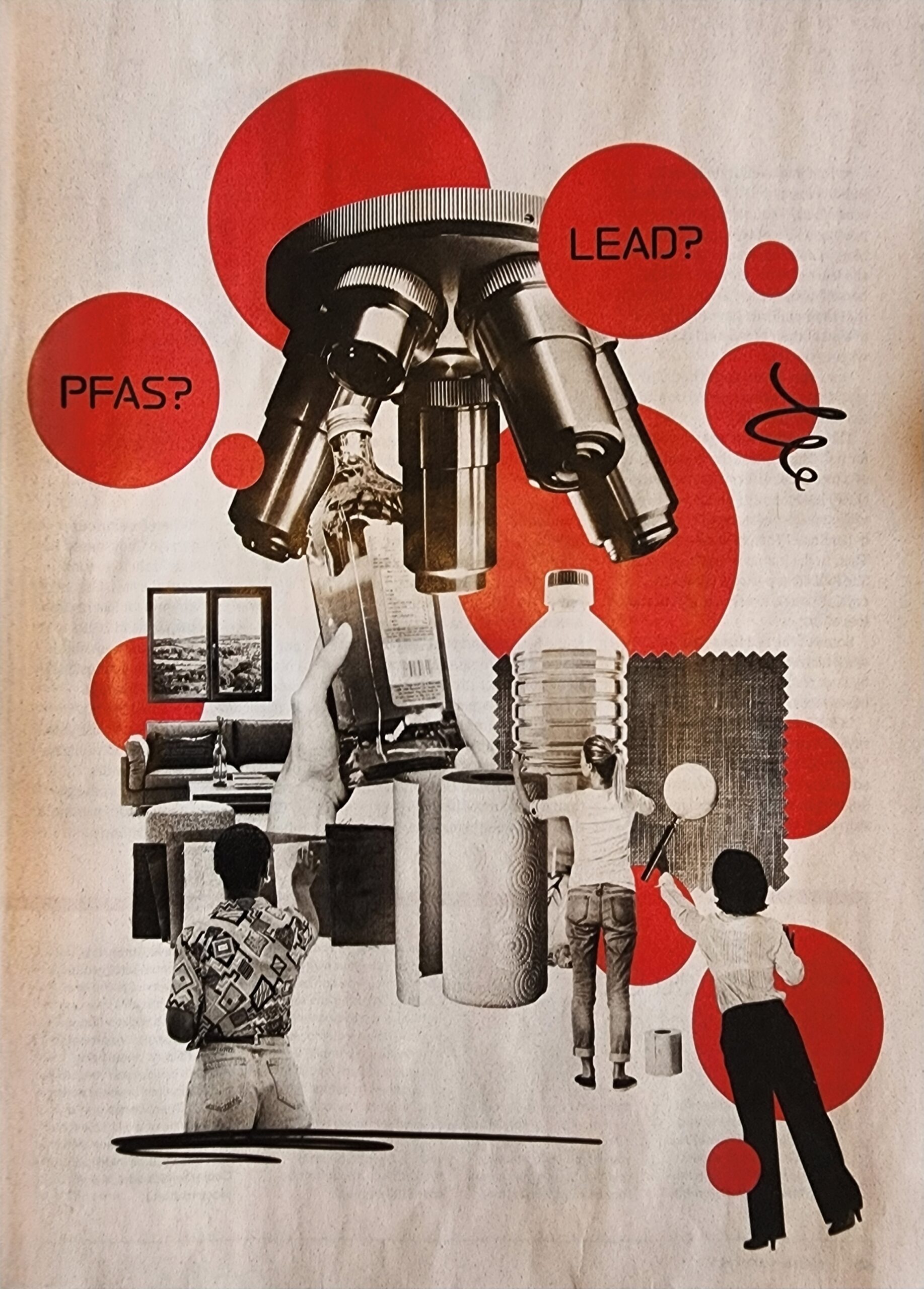This is just one example of the impact that good honest journalism can have (vs. the “yellow” journalism we normally see!)

Wednesday – February 1, 2023
Yesterday I started seeing some early feedback online in response to the current Consumer Reports Magazine article – feedback that was so heart-warming, I just wanted to share some of it with you all! It really reflects the impact good journalism can have – especially in a journalistic climate when (more often than not) the news cycle is filled with misinformation – impacted by corporate influence.
I’ve often lamented that the attacks on my advocacy work (including ridiculously-“spun” articles by popular but questionable “news outlets” that #1) don’t bother to interview the source of the information they are writing about, and #2) don’t bother to carefully read the background information for the subject they are reporting about) have done significant damage, in terms of both diminishing the concern for the potential impacts of Lead exposure generally and diminishing the credibility of the work of Lead Safe Mama, LLC specifically — especially in the minds of folks who are newly aware of the concern of the need for Lead-poisoning prevention and consumer goods safety. Just look up the the issue of dangerous levels of Lead found in the exterior paint of vintage Pyrex items (a provable and undisputed point of science), and you will find as much misinformation (or more) as you will find true science-based (=factual/unbiased) information!
I have also always hypothesized that the more credible news sources we have reporting on the factual, science-based findings of Lead Safe Mama, LLC (and others doing similar work), the faster society will make headway on tackling some of the more important issues [like getting the Lead Paint off of baby bottles and other baby feeding items manufactured and sold today]! The impact of sharing science-based information (especially for the protection of human health) really happens one person at a time, one voice at a time – however, it is significantly accelerated when citizens are reading about (and believing unbiased reporting about) indisputable scientific facts in a reputable news source.
So yesterday, when I read the following comment from a reader (which may seem like a very small and insignificant comment to some),
“My mom texted me last night and she said she read about you in consumer reports as well., I’m not sure what the article was about, but now she wants to get rid of her crockpot finally after I’ve been begging her for a year lol”
I was profoundly struck by what was demonstrated by this reader’s simple shared words — an example clearly demonstrating that good (unbiased, straight-forward science-based/fact-based) journalism can be a significant factor in advancing a cause, one person at a time.
The reader who made this comment had clearly tried to convince her mother to stop using a piece of cookware that potentially may have unsafe levels of Lead (something that could be harming her health and the health of her family.) She tried for a year — but it took a clear unbiased, supportive, fact-based article in a respected journalistic source [Consumer Reports Magazine] – a source she trusted – to get her on board that this was a legitimate concern being expressed by her daughter.
This is actually representative of a constant uphill battle that friends of Lead Safe Mama dot com face – convincing their elders that our work here is legitimate. It’s a battle that is made that much more difficult when so many “journalists” respond to our work by either publishing outright misinformation or by not clearly publishing the facts — succinctly, with proper context, and without any “spin” — in a manner that doesn’t invite misinterpretation [misinterpretation that – for example – has been happening with coverage of the KitchenAid stories in the news cycle over the past month*].
My joy in seeing the impact that responsible journalism could have on a reader (on a person, on a family) was also accompanied by a profound level of sadness over the fact that these days, this is the stand-out exception, rather than the norm. One can see this clearly by looking at the impacts of the viral nonsense from the industry-influenced so-called “official fact-checking” over the KitchenAid Lead-contamination issue throughout the month of January 2023.
*For those who have not been following the KitchenAid issue (and I will just touch on it here, but you can read more about this in other articles on this website), outsourced “fact checking” entities have written about the concern for Lead in KitchenAid stand mixer attachments with such careless/cavalier ambiguity [a complete lack of specificity that appears to be intentional and — and/or clearly influenced by industry (based on the journalists’ noted sources)] that readers of these ostensibly “fact-checked” pronouncements are left mistakenly understanding that the articles are stating (or implying) that there is no Lead in the KitchenAid attachments (which is alarming, as these items do test positive for Lead — at levels that U.S. regulatory agencies have determined is unsafe in items intended for use by children).
When challenged about their subtle but impactful misrepresentation of the facts, these “journalists” defensively assert that their “fact-checking” is “limited to debunking the myth that there is an active recall of the product”, but this sidesteps the fact that their sloppy/reckless journalism (lack of linguistic clarity and specificity) has left readers dangerously misinformed – with the mistaken impression that not only is the erroneous claim [shared widely on social media] that “the manufacturer has issued a recall of the products” false — but additionally that Lead Safe Mama, LLC’s publication – of factual, replicable science-based quantitative test results confirming the widespread Lead-contamination of the products – was somehow presumably false, as well!
So with this, I want to profoundly thank Lauren Kirchner, the (legitimate) Journalist with Consumer Reports Magazine – a responsible news source – especially when it comes to consumer goods safety concerns – for reporting facts without bias, and for elevating the conversation of the validity of “citizen scientists” (and moreover specifically showcasing women’s spearheading of this movement!), and the work we do for the benefit of society — even against the headwind of harsh criticism and irrelevant b.s. in the news cycles published by outlets – and journalists – with little-to-no journalistic rigor or integrity.
Thank you Lauren! I’m excited for the future of your work with Consumer Reports — and I look forward to seeing what you report on next!
Never Miss an Important Article Again!
Join our Email List





